|
Jonathan Paul Cook on Footsbarn, communal
living, and rural theatre
Footsbarn Theatre formed originally in Cornwall in 1971,
where they made their name as a pioneering theatre group before moving,
ten years later, to continental Europe where they are based now. JP Cook (picture
below right as 'Tristan') was their co-founder. e-interview by Rupert
White
Can you say a few words about your early life? Where did you live as
a boy? How did you first become interested in acting?
One could say I first wore a mask even before I was born! My mother
danced well into her pregnancy in Ballet Jooss' post-war tour of Kurt
Jooss' famous masked ballet ‘The Green Table.’ She used to tell me
‘You've danced on the best stages in Europe!’ It was her colleagues who
educated Pina Bausch. After I left Footsbarn she took over my role as
the movement trainer, and also choreographed some of their dances. When
Footsbarn was in rehearsal in far away places like Portugal and Italy,
they used to fly her out from Cornwall to work with them. ‘Someone has
to get them up in the morning!’ she used to say. She taught a weekly
dance class in Lostwithiel well into her nineties.
My father was a musician. He conducted at the Old Vic for Olivier, and
composed for Tyrone Guthrie and Michael Langham at the Stratford
Shakespearean Festival, Ontario, Canada.
My first memories of life and theatre are of Stratford-upon-Avon,
England. When I was seven we emigrated to Canada where I began to act on
stage and television, pro and semi-pro. I also built a theatre in the
family garage, and, in the cellar, a grotesque horror-house installation
to terrify my playmates. On one occasion my best friend and I covered
ourselves with ketchup and fought to the death in the open street,
causing elderly neighbours much worry. Aaagh, Melodrama!
When I was fifteen we moved to Boston, USA. As a teenager I was a
science nerd, although I found the students in the highschool Drama and
Folk Music Clubs to be much more fun than my fellow nerds!
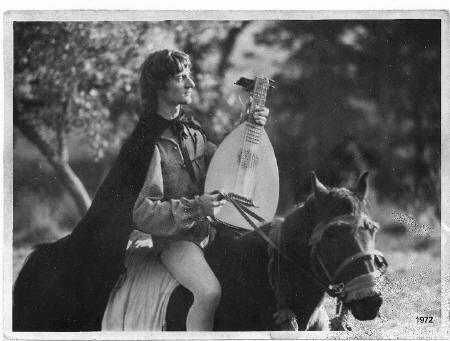 You co-founded Footsbarn theatre group, based at Trewen near
Liskeard, with Oliver Foot in 1971. Can you explain where you originally
got the idea from? You co-founded Footsbarn theatre group, based at Trewen near
Liskeard, with Oliver Foot in 1971. Can you explain where you originally
got the idea from?
The idea of a barn originated at Goddard College in the mountains of
Vermont (north of New York), where Oliver and I first met. There is a
theatre there called the 'Haybarn', where we acted together in
productions of 'Twelfth Night' and 'A Taste of Honey'.
We were both familiar with the Barn Theatre at Dartington, both having
family from the Westcountry: that we found another Englishman with
shared references and interests, seemed like an extraordinary
coincidence. So we began dreaming and planning about getting our own
barn theatre in the South West. We had a book, 'The Book' as it was
accurately and affectionately known, in which we wrote and passed back
and forth our latest ideas about our big dream.
When Oliver and I were not jamming on creating a theatre company in the
Westcountry, we were impatiently waiting for the next Beatles album to
arrive, and wondering how it would alter the Universe, and point to the
next step in human evolution!
What was Goddard like then?
Goddard was an exceptional theatre environment. There was an emphasis on
devising, and there was already performance art being presented. Bread
and Puppet Theatre performed twice while we were there, before and after
their success at the Nancy Festival, and eventually became the resident
company.
When I first arrived there, it was in the hope of studying the
psychobiology of perception (Yes, really!), but a fellow student by the
name of David Mamet (now a well-known screenwriter) suggested I investigate my childhood interest in
theatre. ‘Okay,’ I thought, ‘Just one non-academic pursuit.’ One class
with Pablo Vela (of Meredith Monk's ‘The House’ fame) and for the first
time I realised it wasn't just with science that one could experiment.
And it was mainly that, the experimentation, which I loved. I was
hooked!
Fellow Goddard student Jeff Glaser, David and I formed a little
travelling company, ‘Suitcase Theatre,’ and toured New England colleges
and Montreal in 1967. Some years later, but still an unknown writer,
David offered me ‘Duck Variations’ to take back to Footsbarn. ‘Yes,’ I
thought, ‘But no, not really Cornish fare,’ and politely declined.
Idiot! To think how close Footsbarn came to presenting the first
European production of a Mamet play!
After opting to specialise in drama you and Oliver attended
separate drama schools…
Yes, we took off to London and Paris, quite consciously to equip
ourselves for forming a company.
You trained with Jacques Lecoq in France. Can you describe his
teaching? How did he inspire or affect Footsbarn?
Lecoq's work followed from his belief that theatre needed to return to
its roots to revalidate itself. He did not posit any ideal aesthetic. So
his teaching was very much in sympathy with our eventual research into
an ‘untouched’ audience.
Lecoq’s application of the ‘via negativa’ kept his students in a state
of almost constant frustration, but the process selected for passionate,
resilient artists. His approach to the body was all about understanding
and exploiting what was there, rather than imposing perfect forms upon
it. He saw mime as only a starting point, not a finished genre. He
looked to the rhythms of Nature to challenge the student actor's powers
of transformation.
Lecoq introduced us to a spread of traditional, evolved theatre styles
such as the commedia dell' arte and clowning that served us well as
tools to explore our relationship with the Cornish audiences. And of
course there was all the mask work, which chimed with the earlier Bread
and Puppet influence. Eventually, when the company became established in
France, he was very supportive and even gave the actors free workshops!
And then you and Oliver regrouped?
Yes, after two years training, bringing other actors with us. Arriving
back in England, I presented Oliver with a wooden mug, saying ‘This is
the kind of theatre I want to do.’ It was hand carved out of a single
block of wood by an East European craftsman. The handle projected at an
odd but accommodating angle, and the rough surface was stained a deep
maroon from two years of drinking French wine and Normandy cider.
Oliver had met a group of musicians in London and one of them, Tom Wildy,
later a Plymouth Councillor, had inherited some money from his
grandparents which became our front money for buying the Trewen
property.
Contrary to information one might find on the internet, the Foot family
never owned the barn at Trewen. Tom and Oliver became co-owners with the
understanding that Oliver and the theatre company became responsible for
the mortgage payments and community expenses - a rather bizarre and not
entirely successful arrangement! Oliver was the nominal theatre director
for the first year-and-a-half, and it was hoped that the family name
might open up some doors for us.
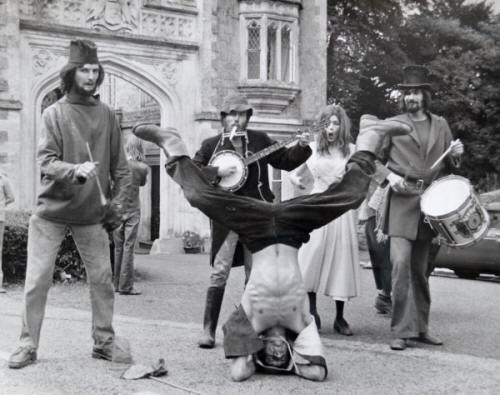
Who else was involved in the first year or two of Footsbarn’s
existence? How did you know them, and what was their contribution?
There were five original members of the theatre group: Oliver, myself,
Serena Hendersen whom I brought with me from Lecoq, and Maggie Watkiss
and Andrew Slimon who were Oliver’s fellow students at Peter Layton’s
Drama Studio in London.
Serena was an actress with a broad range, a charged imagination and a
convincing vulnerability. Maggie would tackle any role with warm
generosity and a light comic touch. She was for many years a stalwart of
Footsbarn. Both women were devoid of ‘actressy’ posing and vanity. Andy
was a wiry, passionate actor and a great on-stage partner, naturally
demonstrating the ‘complicity’ that Lecoq valued so much.
A couple of the musicians (Tom Wildy and Richard Worthy) were also
talented actors who had trained at the East 15 theatre school and
participated in some of the productions, but like almost every young
actor I have met, their dreams were to be rock stars!
Very soon after we started, Dave Johnston, one of Oliver’s old friends
from Dartington, came by with his guitar on his shoulder. A talented
song writer with a theatre background, he was on his way to being the
next Donovan or Cat Stevens, but became sidetracked by our ambitious
little project. As a writer, Dave was to become the single most important creative
influence within the company for many years. He combined musicality, a
raw sense of language, and a sense of story.
Quite early on, Keith Bruce, an inventive designer and friend of Andy
Slimon, came down to Cornwall to be our set designer and mask maker.
Michael Novotny, an American friend from Goddard College dropped by on
his way to Africa and also wound up staying. Mike was a talented
painter, and knew a lot about printing and glass fibre construction.
Keith and Mike took over the Trewen garage, hung up a sign that read
‘Stallion Enterprises’ and went about developing a visual language that
was part underground comics, part Francis Bacon, and part Fairground
kitsch.
They were supplemented in the costume department by my sister Jenny who
had studied fashion design and would later be Costume Supervisor at the
Royal Court Theatre.
Siblings working together were not uncommon at Footsbarn. Dave Johnston
brought in his brother Steve to work as musician and actor. Paddy Hayter
brought in his brother Dave to work as a technician.
New actors weren’t hired or even vetted in any conventional way. They
more or less just ‘happened.’
Joe Cunningham came down to be a roadie for the musicians, participated
in the movement training, demonstrated a flair for physical
characterization, was given a drum to bang in ‘Tristan,’ and before you
could say ‘Nice one Cyril!’ had begun his life’s career as a Footsbarn
actor.
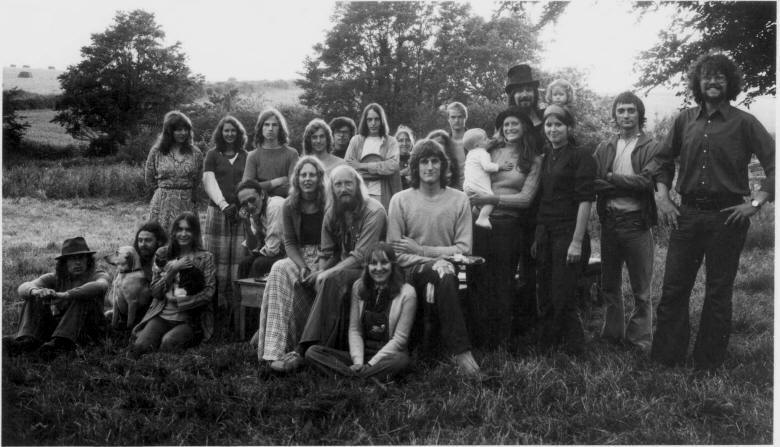
Steve Lawrence had been an eager student at a weekly workshop Oliver and
I taught at Plymouth Arts Centre. As soon as he was old enough he came
out and joined us as an actor and eventually also took on administrative
responsibilities.
Joanna Tagney dropped by to investigate rumours of Cornish creative
madness and ended up staying for some years.
I had known Margarete Biereye at the Lecoq school. By coincidence she
later hitched up with a lad from North Devon, Paddy Hayter. Paddy had
visited us and expressed an interest in Footsbarn before he left for his
two year training with Lecoq, where they met. When they had finished
their training they came to join us.
Eventually Paddy would be the one to fight the hardest and longest to
keep Footsbarn on the road.
Can you describe what life was like behind the scenes at Footsbarn at
that time? I understand it was quite a large community: the barn itself
being used for rehearsals, and many of the actors living in caravans
etc. nearby.
Yes, Footsbarn was as much an anthropological as an artistic phenomenon!
It was part of the larger entity 'Trewen Community,' Trewen being the
name of the farm that straddled a lane between Liskeard and Looe. With
families and all, there were between fifteen and thirty people living
there (picture above: the Trewen Community in early 1972). We worked in the barn, and there were also stables that became
the studio for the musicians.
For public consumption it was always: 'No we are not a commune, we are a
community!' But in fact I have yet to come across a more chaotic and
intense form of communal living. Perhaps it was precisely because there
was no considered social ideology behind it, that it was able to be so
extreme and yet endure. In the beginning there were a minority of
idealists for whom a structured alternative way of living was of
particular importance, but they gave up in despair and left after but a
year or two.
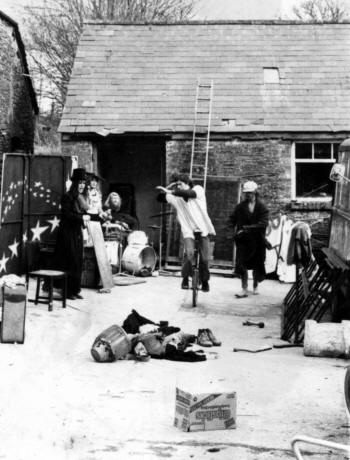 There were no personal wages, just endless brown rice and beans.
Everything was bought in bulk, even the toothpaste. I remember a five
gallon drum of yeast extract sitting in the pantry that lasted four
years; just scrape the mould off the top and dig in. There were sporadic
attempts at tending a kitchen garden and raising goats, but the only
real success was with Jerusalem artichokes, a plant that really knows
how to fend for itself. And of course there was a well publicised
temporary success at growing a certain non-edible crop, but that is
another story.... There were no personal wages, just endless brown rice and beans.
Everything was bought in bulk, even the toothpaste. I remember a five
gallon drum of yeast extract sitting in the pantry that lasted four
years; just scrape the mould off the top and dig in. There were sporadic
attempts at tending a kitchen garden and raising goats, but the only
real success was with Jerusalem artichokes, a plant that really knows
how to fend for itself. And of course there was a well publicised
temporary success at growing a certain non-edible crop, but that is
another story....
Sometimes a new member of the community was designated as cook – one
could hardly say hired – and there would be a meal waiting for us on the
Aga when we came back in the evening after a performance. Otherwise it
was the ubiquitous 'cheese dream' - melted cheese on toast – or peanut
butter spread on unleavened bread baked in bricks so hard it needed an
angle grinder to slice them.
After a couple of years a concession was made to individual needs. In
the kitchen, high up on a shelf, so high that you needed to stand up on
a chair to reach it, was a jam jar in which ten or fifteen pounds
sterling would be placed weekly. You could take from it at your own
discretion, but presumably the inaccessibility gave you plenty of time
to struggle with your conscience.
Commune or community? Well for the most part we didn’t care. We were
much too involved in making theatre and music. We avoided holding
community meetings whenever possible, and it was not unusual to hear
someone shouting across the fields 'Community? Fuck!!' We were
shamefully delinquent in caring for the beautiful Trewen property.
Attempts at overt leadership were met with suspicion and derision.
But it was this same anarchic tendency to question authority and shun
the conventional that nudged us towards devising our own material, and
kept us stubbornly looking for an original Cornish style even as the
well-meaning Ian Watson, Director of South West Arts, understandably
implored us to straighten up our act and bring in an outside director
for a few months to help us out.
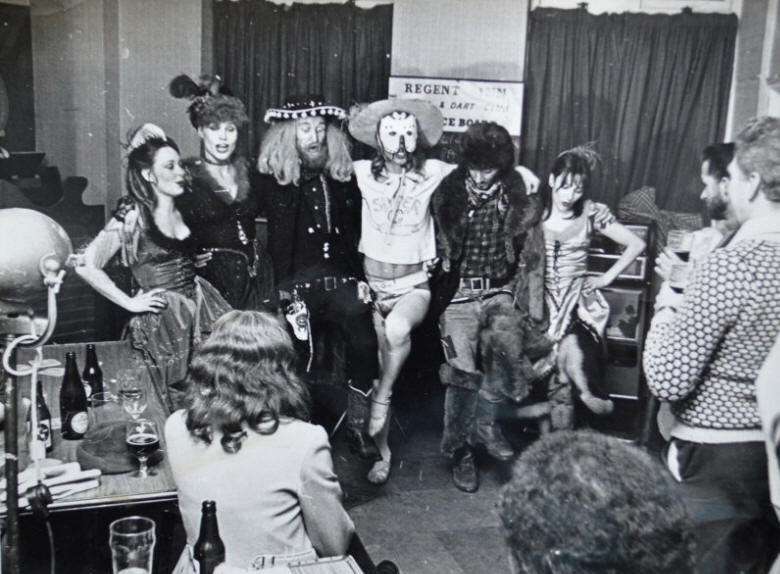
Footsbarn was prolific during your time with them. Can you list the
productions that you remember? Is there one that is particularly
memorable, or notable?
Here’s a list of the shows produced while I was there. I won’t vouch for
all the dates. The venues ranged from well established institutions such
as Dartington Hall, Plymouth Arts Centre and the Falmouth Arts Centre (FAC),
to village halls, town squares, beaches, pubs, working man’s clubs and
schools. We never performed for the public in our barn. It was only used
for rehearsal. We usually opened our winter touring productions at
nearby Trewidland Village Hall, for the simple reason that if we had
forgotten something, it wasn’t far to go back and get it.
From established writers:
'Endgame' Beckett, 1971 (DH); 'The Bald Prima Donna' Ionesco, 1971
(PAC); 'The Bear' Chekhov, 1972 (FAC); 'A Resounding Tinkle' NF Simpson,
1972 (FAC); 'Zoo Story' Edward Albee, 1972 (FAC); ‘Next Time I'll Sing
To You’ James Saunders, 1972 (FAC).
Written, devised or heavily adapted by us:
'The Gump St Just' 1971; (Piran Round);
'Tregeagle' 1971 (Piran Round); 'Perran Cherrybeam' 1971 (various
locations); ‘Jeux Gratuit’ 1971(DH); 'Woodcut' 1971 (PAC); 'Giant' May
1972 (tour and FAC); 'Crow 10' 1972 (FAC); 'Tristan' 1972 (village
halls); 'Master Patalan' May 1973 (outdoors tour); 'Jack and The
Beanstalk' Winter 73/74 (village halls); 'Pot of Gold' May 1974
(outdoors tour) 'John Tom' 1974 (village halls); ‘Underwater Worlds'
1974 (Theatre In Education school tour); ‘The Scarecrow and The Corn
Spirit' and 'Greta’s Follies' (children’s shows); ‘Incident at Crazy
Cowpoke Saloon’ (pub show - picture above); 'Legend' May 1975 (first tour to use the
marquee).
'Tregeagle' was a moral tale about an evil judge. Played at Piran Round
(picture below),
an ancient earthen works fortification the size of a field. It was site
specific, as one would say now. We were spread pretty thinly in that
large space, for which we endeavoured to compensate by inviting in other
members of Trewen Community as extras and musicians, and by running
madly about with a large black cloth held above our heads. It was our
first use of Cornish folklore, and the first time we combined masks,
music and theatre to create spectacle. In other words, the basic
ingredients of Footsbarn’s style were already there.
‘Giant’ and ‘Tristan’ were important milestones in the evolution of the
company style. They were the ones the audiences remembered for years
after.
‘Crow 10’ was interesting because it was the least typical Footsbarn
production, and because we learned an important lesson from it. It was
Michael Novotny’s initiative. He had painted a series of very large
canvasses inspired by the poems of Ted Hughes. He and I agreed that the
paintings should be treated as the equal of the actors, that the
scenography should be the star players.
It was a bizarre aesthetic experiment, and there was a general air of
scepticism among the rest of the company. How dare we take ourselves so
seriously! Little absurd scenes of domestic life were inserted between
the frames, such as a woman falling face forward into her bowl of
breakfast cornflakes. And yes, we were serious, and the more we
struggled with the material, and the more scepticism we met, the more
serious we became. We were creating a beautiful but remote little work
up there on Falmouth Arts Centre’s proscenium stage. We were in trouble.
Suddenly Richard and Dave appeared in front of the stage like two
irreverent crows, dressed in black and chugging down two very white pint
bottles of milk. Their original intention may well have been to take the
piss out of the production, but they wound up discovering the audience
and ‘selling’ the show.
We learned how comedy and self-irony can build an audience’s trust in a
production, so that they become willing to enter into more dangerous
territory.
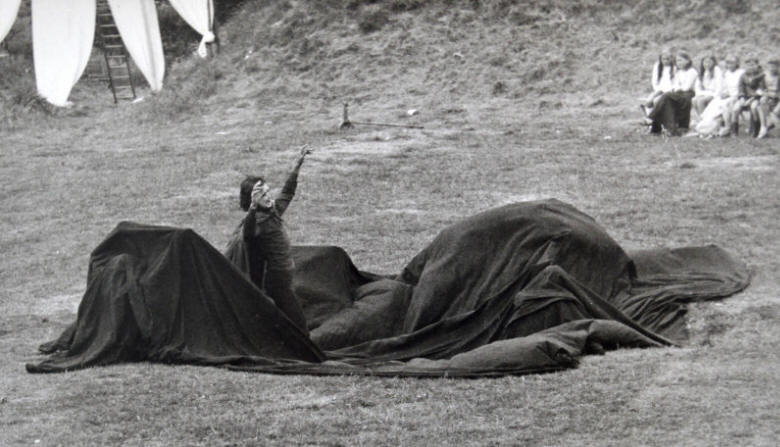
How did the Footsbarn style evolve during this period, and to what
extent was this style shaped by the context of Cornwall?
Footsbarn owes Cornwall an enormous debt. It is a classic example of
discovering universal relevance through concentrating on an individual
case. By focusing on the specific, namely what would work for a Cornish
audience, Footsbarn discovered a theatrical language with universal
appeal.
Cornwall was to be our laboratory. We were very clear and up front about
this. We were going to research theatre in terms of the audience, a
grass roots audience, and Cornwall was going to provide us with an
unspoiled environment. We didn’t want audiences with polite conditioned
reflexes. It was pointed out to us that, mostly, the Cornish hadn't seen
anything like us since before the Wesley brothers came preaching down
the peninsular. I think we were as evangelical as they in our faith in
the power of live theatre!
The first efforts included works by Ionesco, Beckett and Albee, and some
abstract clown and mime pieces. We did some good work, it gave us some
legitimacy with the regional arts environment, but as you can imagine it
didn’t really connect with our target audience of farmers, tin miners
and fishermen!
From the beginning we looked into Cornish folklore as a source of
relevant material and it soon became clear that we were on the right
track.
Oliver came up with the idea of the May Tour, in which we would play out
of doors, live in tents, ‘bury the chequebook,’ and live off passing the
hat.
So we did endless parades through small villages and sprawling council
estates, playing music, shouting through megaphones and banging drums to
round up an audience for the show on some village green, town square or
circus pitch. Here are the words to one of the songs we sang, to the
tune of the Furry Dance:
Footsbarn has come to town:
Jugglers, acrobats and clowns.
Footsbarn has come to town,
All the children dance around.
Come and see it’s a very funny play
We’ll put on for you today.
Seven o’clock the show begins;
Up my kneecaps, down your shins.
I can remember the first time a member of the audience, a first timer,
came up after the show and said 'Fantastic! It was just like being
inside a television set!'
The other dimension to our work was that Oliver and I were aware that we
had taken very different trainings, as had also the people we brought
with us. Oliver’s training was more verbal and ‘method,’ and mine
physical and expressive. We set it as a basic task for each ‘camp’ to
teach the other what we had learned in the two and a half years since we
had last worked together in Vermont.
When Footsbarn finally left Cornwall, they went off to find appreciative
audiences as young and anarchic as themselves in the hip and fast moving
European festival scene. What worked in Cornwall could also work in
Amsterdam. But without Cornwall there was an empty hole. Luckily their
tastes and travels would continue to bring them into close contact with
rural and indigenous peoples.
They continued to draw inspiration from the diverse cultures they met in
such far flung places as Alice Springs, the Portuguese mountains, Bali
and Kerala. Footsbarn is still connecting with the individual, and
rediscovering the universal.
Were you aware of other theatre companies attempting something
similar at the time?
There was really nothing like us in Cornwall. We would occasionally
discover pockets of sympathetic amateur theatre activity, for example in
Davidstowe. And of course there were such places as the Minack Theatre
and Falmouth Arts Centre, but they were more interested in bringing high
culture down from London, instead of going out and learning from a rural
audience.
There were two companies in Devon that were also under South West Arts
Association's wing, Medium Fair (John Rudlin) and The Orchard Theatre
(Andy Noble). They, like us, were interested in bringing theatre to a
rural audience. We met on the SWAA's Drama Advisory Panel. Also a few
nationally touring groups made an impression on us: The People Show and
Brighton Combination, for example. I remember Welfare State setting off
flares and accidently bringing out the Cornish lifeboats!
The Guardian journalist, Allen Sadler, took a very generous, nurturing
approach to our work. It is all too rare that reviewers understand that
their responsibility is not just to their readership, and that there are
such things as artistic potential, growth and evolution, and that it is
still possible to maintain journalistic independence within a longer
term dynamic relationship with the subject they are reviewing.
I remember Sadler asking us, and I smile warmly as I remember it, 'Don't
you ever think about asking questions about society's problems in your
plays? You don't have to provide any answers!'
I think many people were surprised that Paul Foot's brother (and Michael
Foot's nephew) should be so apolitical. Oliver was not interested in
politics, but he was a charismatic diplomat, talents he would later put
to good use as the director of the Orbis flying eye clinic.
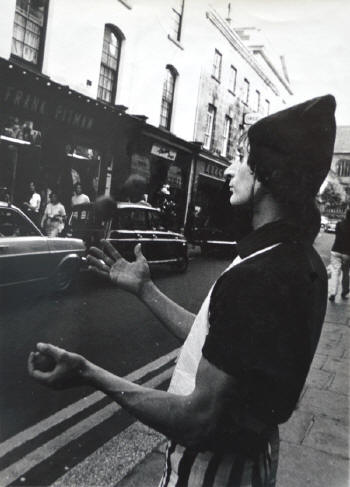 You started Footsbarn Theatre motivated by some high ideals. But
was there anything that disappointed you about your time with them? You started Footsbarn Theatre motivated by some high ideals. But
was there anything that disappointed you about your time with them?
Yes, of course. Trewen Community was hardly an homogenous group, but
perhaps one could say that among the active members there were those who
accepted the marginal life style as a necessary compromise in order to
pursue their art, and there were those who saw their art as a convenient
means to support their chosen way of life. This contrast was a frequent
source of tension.
For me it was not so much a question of 'Who is pulling their weight and
who not?' That question was too hard to judge, one could never expect
equality, and eventually it tended to sort itself out. What I found
disturbing, and eventually very painful, was that the same buoyant,
devil-may-care, finger-in-yer-face attitude that made it possible to
survive against all odds, and was instrumental in generating a gutsy
theatre style, frequently erupted into reckless behaviour that
jeopardised this project that was my life’s dream.
'Frequently erupted into reckless behaviour!'... Well I won’t go into
the sensational details, but, more to the point, you can already hear
how prudish I sound. In a world of anarchy it is easy to sound like a
moralist. But I had a lot invested in this project. I had worked with
Oliver on the planning for over three years before we even started in
Cornwall, and dropped out of college to do it. I had no other plan.
Anything that threatened to alienate our audience I found deeply
upsetting.
Another one of the things that began to disappoint me about the company
in the time before I left is that the members were often very cynical
about certain kinds of people in the wider community that were willing
to help us, by whom I mean the middle class, established, intellectual,
artsy-fartsy, culture vultures and liberal masochists. They were not our
target audience, but they tended to be active in their communities,
loved our work and offered encouragement. However, we were just not
willing to forgive them their vicarious pleasures at seeing us fulfil
their romantic dreams. But, my god, they forgave us for so much!
How did you leave Footsbarn?
Anyone who has spent a significant slice of time working with Footsbarn
has dealt with the question 'Is There Life After Footsbarn?' It always
seemed like what we were doing was immensely important, heroic,
pioneering stuff and to leave the struggle would be an act of cowardice
and condemn one to eternal insignificance.
I had always seen it as a four year experiment. In some ways I had
trapped myself in my own ideology. When there was any discussion about
taking a show up to London I would argue that London should come down to
Cornwall and see us in the proper context. And after all, it was fifteen
years before Molière took his company into Paris! I realised later that
I had been starving for input and inspiration.
I was only able to leave in good conscience by joining an even more
brutal operation: a traditional circus with king poles bending from
metal fatigue, lorries without functioning footbrakes, a shelf in a
horse wagon for a bed, hands calloused from swinging fourteen pound
sledges, supercilious camels, neglected bears, and lions in derelict
wagons competing to decapitate their alcoholic trainer. I joined to work
on the tent, and got pushed into the ring to be a clown. It was very
hard work. It felt like being in a guerrilla band moving through enemy
territory.
The performance itself was an anticlimax. One was so numbed by fatigue
that one could even forgive the feeble attempts at aesthetic values
expressed by the artists in their personal choices of fishnet stockings.
But the strangest thing to adjust to after all those years of brown rice
and beans was being paid in hard cash!!!
Some very fine people came in and out of Footsbarn after I left, and my
biggest regret is that I didn’t have the opportunity to work with them.
However, one has to remember that as in so many fields, from IT startups
to travelling theatre companies, some people are the initiators and
others are more suited to sustain a project.
I think of Footsbarn as a kind of benign disease that incubated while I
was there, and went on to infect many other people.
When I came back to Cornwall after a couple of years to see the
production of ‘Arthur’ I was blown away. The style we had dreamt of had
arrived. In spectacle, story, character and atmosphere, ‘Arthur’ was
‘it.’ I realized that Footsbarn was still my favourite theatre company.
JP Cook's personal website:
http://www.jpcook.dk/jpc_cv.html
Footsbarn Theatre:
http://www.footsbarn.com/en/
If anyone reading this has more photos, memorabilia or memories
relating to Footsbarn in Cornwall please contact
rupert.white@virgin.net
(also see feature 'Footsbarn
Flyer')
|







